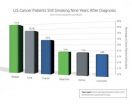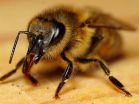(Press-News.org) PHILADELPHIA — Nine years after diagnosis, 9.3 percent of U.S. cancer survivors were current smokers and 83 percent of these individuals were daily smokers who averaged 14.7 cigarettes per day, according to a report in Cancer Epidemiology, Biomarkers & Prevention, a journal of the American Association for Cancer Research (AACR).
"We need to follow up with cancer survivors long after their diagnoses to see whether they are still smoking and offer appropriate counseling, interventions, and possible medications to help them quit," said Lee Westmaas, PhD, director of tobacco research at the American Cancer Society (ACS) and lead author of the study.
Roy Herbst, MD, PhD, chief of medical oncology at Yale University and chair of the AACR Tobacco and Cancer Subcommittee, who was not involved with the study, said in an interview that the findings illustrate the scope of the problem.
"Smoking can cause new mutations among cancer survivors that can lead to secondary and additional primary cancers. It can also affect physical function and interfere with the efficacy of therapies," Herbst said. "We need to take note of this and target this population for intervention."
In the study, researchers at the ACS analyzed data on 2,938 patients nine years after their diagnoses.
Smoking prevalence by cancer type:
bladder cancer (17.2 percent)
lung cancer (14.9 percent)
ovarian cancer (11.6 percent)
melanoma (7.6 percent)
kidney cancer (7.3 percent)
colorectal cancer (6.8 percent)
Survivors were more likely to smoke if they were younger, had less education and income, or drank more alcohol.
About 40 percent of smokers said they planned to quit within the next month, but this intention was lower among survivors who were married, older, or smoked more.
"Smoking is addictive and having cancer does not guarantee that you will stop, even if that cancer was directly tied to your smoking," said Westmaas. "We need to do more to intervene with these patients."
INFORMATION:
EDITOR'S NOTE: In a 2012 policy statement, published in Clinical Cancer Research, the AACR said that assessing tobacco use should be part of any standard cancer care plan and oncologists should receive cessation training. Herbst chaired the committee that wrote that report.
Follow us: Cancer Research Catalyst http://blog.aacr.org; Twitter @AACR; and Facebook http://www.facebook.com/aacr.org
About the American Association for Cancer Research
Founded in 1907, the American Association for Cancer Research (AACR) is the world's oldest and largest professional organization dedicated to advancing cancer research and its mission to prevent and cure cancer. AACR membership includes more than 34,000 laboratory, translational, and clinical researchers; population scientists; other health care professionals; and cancer advocates residing in more than 90 countries. The AACR marshals the full spectrum of expertise of the cancer community to accelerate progress in the prevention, biology, diagnosis, and treatment of cancer by annually convening more than 20 conferences and educational workshops, the largest of which is the AACR Annual Meeting with more than 18,000 attendees. In addition, the AACR publishes eight peer-reviewed scientific journals and a magazine for cancer survivors, patients, and their caregivers. The AACR funds meritorious research directly as well as in cooperation with numerous cancer organizations. As the Scientific Partner of Stand Up To Cancer, the AACR provides expert peer review, grants administration, and scientific oversight of team science and individual grants in cancer research that have the potential for near-term patient benefit. The AACR actively communicates with legislators and policymakers about the value of cancer research and related biomedical science in saving lives from cancer. For more information about the AACR, visit http://www.AACR.org.
Nearly 10 percent of patients with cancer still smoke
2014-08-06
ELSE PRESS RELEASES FROM THIS DATE:
Healthy diet set early in life
2014-08-06
Promoting a healthy diet from infancy is important to prevent childhood obesity and the onset of chronic disease.
This is the finding from a study published in the latest issue of Australian and New Zealand Journal of Public Health.
Led by Rebecca Byrne from QUT, the study described quantity and diversity of food and drinks consumed by children aged 12-16 months.
"The toddler years are a critical age in the development of long-term food preferences, but this is also the age that autonomy, independence and food fussiness begins," Ms Byrne said.
"Childhood obesity in ...
Nutrition an issue for Indigenous Australians
2014-08-06
Nutrition has not been given enough priority in national Aboriginal and Torres Strait Islander health policy in recent years.
This is the finding from a study published in the latest issue of Australian and New Zealand Journal of Public Health.
Led by Jennifer Browne from La Trobe University, the study examined Aboriginal-specific health policies and strategies developed between 2000 and 2012.
"Increased inclusion of nutrition in Aboriginal health policy was identified during the first half of this period, but less during the second where a much greater emphasis was ...
Crime Victims' Institute tracks the state of stalking in Texas
2014-08-06
HUNTVILLE (8/6/14) -- According to a 2010 survey by the Center for Disease Control and Prevention (CDC), an estimated 1.4 million women in Texas experience stalking during their lifetimes. Despite recent laws adopted in the state to protect stalking victims, little information is available about the crime or policies and procedures to aid the criminal justice system, according to a report from the Crime Victims' Institute (CVI).
According to CDC estimates, 15.6 percent of the female population in Texas will experience stalking, slightly less than the 16.2 percent national ...
Vanderbilt finding may aid recovery from spinal cord injury
2014-08-05
Researchers in the Vanderbilt University Institute of Imaging Science (VUIIS) have achieved the first conclusive non-invasive measurement of neural signaling in the spinal cords of healthy human volunteers.
Their technique, described today in the journal eLife, may aid efforts to help patients recover from spinal cord injuries and other disorders affecting spinal cord function, including multiple sclerosis.
"We definitely hope that this work can be translated to address many neurological disorders," said the paper's first author, Robert Barry, Ph.D., a postdoctoral ...
Researchers boost insect aggression by altering brain metabolism
2014-08-05
CHAMPAIGN, Ill. — Scientists report they can crank up insect aggression simply by interfering with a basic metabolic pathway in the insect brain. Their study, of fruit flies and honey bees, shows a direct, causal link between brain metabolism (how the brain generates the energy it needs to function) and aggression.
The team reports its findings in the Proceedings of the National Academy of Sciences.
The new research follows up on previous work from the laboratory of University of Illinois entomology professor and Institute for Genomic Biology director Gene Robinson, ...
This week from AGU: Sea-level spikes, volcanic risk, volcanos cause drought
2014-08-05
From AGU's blogs: Sea-level spikes can harm beaches worse than hurricane
Unforeseen, short-term increases in sea level caused by strong winds, pressure changes and fluctuating ocean currents can cause more damage to beaches on the East Coast over the course of a year than a powerful hurricane making landfall, according to a new study. The new research suggests that these sea-level anomalies could be more of a threat to coastal homes and businesses than previously thought, and could become higher and more frequent as a result of climate change, according to a new study ...
Biology made simpler with clear tissues
2014-08-05
In general, our knowledge of biology—and much of science in general—is limited by our ability to actually see things. Researchers who study developmental problems and disease, in particular, are often limited by their inability to look inside an organism to figure out exactly what went wrong and when.
Now, thanks to techniques developed at Caltech, scientists can see through tissues, organs, and even an entire body. The techniques offer new insight into the cell-by-cell makeup of organisms—and the promise of novel diagnostic medical applications.
"Large volumes of tissue ...
Researchers uncover novel process for creation of fuel and chemical compounds
2014-08-05
MADISON, Wis. — A team of researchers at the University of Wisconsin-Madison has identified the genes and enzymes that create a promising compound — the 19 carbon furan-containing fatty acid (19Fu-FA). The compound has a variety of potential uses as a biological alternative for compounds currently derived from fossil fuels.
Researchers from the Great Lakes Bioenergy Research Center (GLBRC), which is headquartered at UW-Madison and funded by the U.S. Department of Energy, discovered the cellular genomes that direct 19Fu-FA's synthesis and published the new findings Aug. ...
Baby aspirin? Many doctors don't recommend, despite guidelines
2014-08-05
A majority of middle-aged men and women eligible to take aspirin to prevent heart attack and stroke do not recall their doctors ever telling them to do so, according to a University of Rochester study of a national sample of more than 3,000 patients.
Published online by the Journal of General Internal Medicine, the finding illustrates a common disconnect between public health guidelines and what occurs in clinical practice. The UR study is consistent with other research showing that physicians often do not recommend aspirin as prevention therapy to the general population, ...
Pistachios may lower vascular response to stress in type 2 diabetes
2014-08-05
Among people with type 2 diabetes, eating pistachios may reduce the body's response to the stresses of everyday life, according to Penn State researchers.
"In adults with diabetes, two servings of pistachios per day lowered vascular constriction during stress and improved neural control of the heart," said Sheila G. West, professor of biobehavioral health and nutritional sciences. "Although nuts are high in fat, they contain good fats, fiber, potassium and antioxidants. Given the high risk of heart disease in people with diabetes, nuts are an important component of a ...



